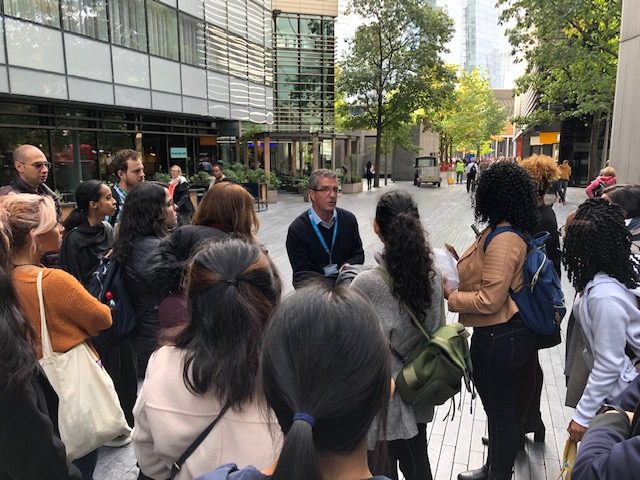This post was contributed by James Fisk, graduate administrator at the School of Business, Economics and Informatics. Here, James reports from the 19th Uddevalla Symposium, held at Birkbeck from 30 June to 2 July 2016. Read James’s first, second and third blogs on the symposium.

Since the advent of the industrial revolution, the notion of the city has held a privileged place in our collective imagination. A place of both prosperity and poverty, a site of both unity and tension, cities are synonymous with modernity and its attendant complexities. Now, for the first time in history, the majority of the world’s population are living in cities and, many people, now reside in Megacities – typically defined as a city with 10 million-plus inhabitants (London is on its way there).
The emergence and continued rise of Megacities is a trend that started in the 20th century, but now looks poised to host many of the antagonisms faced in the 21st. How can cities continue to grow without leaving the rest of the world, and many of their own residents, behind? Is inequality an inevitable and unavoidable consequence of Megacity growth, or is it a matter for political and social intervention? These were some of the questions posed at a keynote panel session held at Birkbeck’s Bloomsbury campus, as part of the 19th Uddevalla Symposium.
The panel, comprising Dr Jennifer Clark, Professor Ian Gordon, Dr Tom Kemeny, Dr Jonathan Potter, Councillor Ali Hashem and chaired by Birkbeck’s Dr Federica Rossi, brought together academics and policymakers to discuss the problematic position of Megacities in the globalised contemporary world. The complex relationship between growth and inequality was a key issue at the panel discussion, with a variety of perspectives on the panel testament to the breadth of the issue and an indication of its wide-ranging implications.
What drives growth in Megacities?
Dr Tom Kemeny discussed the drivers of growth in Megacities and highlighted many features specific to them. Citing London and Los Angeles as appropriate examples, Professor Kemeny discussed how high costs associated with conducting business in cities determine a particular, and necessary, character to the type of service or product produced. New enterprise in both London and LA must be able to contend with the high operational costs associated with the cities, meaning the type of service or product produced will typically be high-value, rent producing enterprises that can offset the cost of high wages. Furthermore, given the concentration of expertise, many of these products or services cannot be easily relocated to elsewhere and the role of a city as a spatial nexus of innovation and connectivity is central to the success of enterprise in such regions.
Dr Jonathan Potter discussed the importance of globalisation and its role in increasing market size, something he says is fundamental to the growth of Megacities. Increases in the mobility of capital and better communications have overcome the traditional constraints of geography and logistics, meaning that Megacities, with their global outlook, are poised to benefit from this paradigmatic shift. Megacities may be the future, but as much as they present unique opportunities, they also present us with unique risks.
Growth and Inequality
The spectre of inequality is one that often runs parallel to growth; if political decisions are not made to distribute the dividends of growth, won’t inequality continue to proliferate? Professor Jennifer Clark spoke at length about this problematic feature of growth, drawing attention to the importance of political discourse in theorizing an equitable solution. Typically, in recent years, the problems associated with growth have been construed as a matter of social policy, rather than a necessary component of economic policy.
However, if the inequality between regions is not the fault of those regions themselves, but the organisation of production by institutions, then the solution required cannot be a technical question but rather a social and economic one for political intervention. As Professor Ian Gordon contended during the panel discussion, it is these political decisions about distribution that sustain and increase inequality, citing the increase of regional inequality from 15% to 30% during the Thatcher government, a period of drastic economic and social change.
Dr Jonathan Potter discussed a fundamental incompatability between inequality and growth, citing recent research from the OECD that saw areas with high inequality experience reduced growth. The reason for this needs further research, but Dr Potter spoke of the importance of human capital and the impact investment in human capital can have on labour productivity.
Translating to Policy
Councillor Ali Hashem (Hammersmith and Fulham Council) spoke of the role of policymakers in both the growth of industry and attempting to make such growth equitable. The difficulty arises from attempting to reconcile macroeconomics, global currents and capital flow, with regional demands and needs. Again, the issue here is that whilst growth must be engineered through economic policy, the consequences of growth must be addressed as a political issue. In this respect, there are many aspects of the global Megacity that must be thought through not just as regional initiatives, but as part of a larger ecology with implications for both those inside, and outside, the city limits.
Click here to watch a video of the panel session.
You can also hear a full audio recording of the panel session on the Bloomsbury media cloud. Relevant courses from Birkbeck’s Department of Management and the Economics, Mathematics and Statistics Department are available on our website.
Find out more








